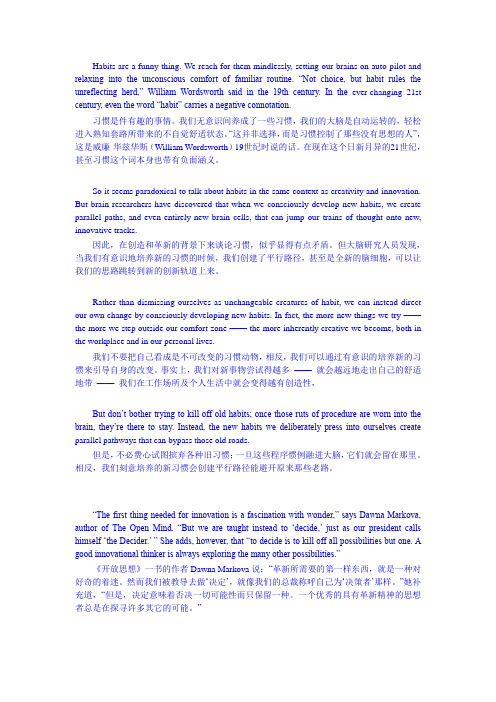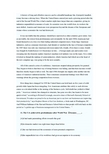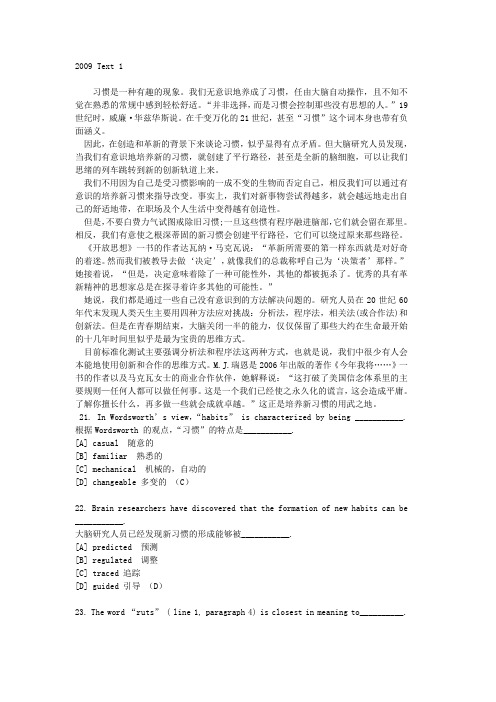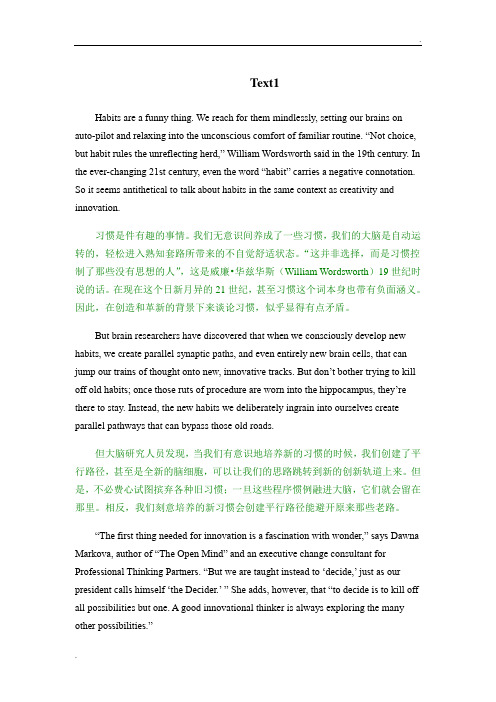英语一阅读翻译2009
2009考研英语阅读全文翻译

Text 1习惯是一件有趣的事。
我们是无意识地在进行我们的习惯,它们是我们的大脑进入自动航行模式,轻松的体会熟悉行为的无意识的舒适。
威廉姆·沃德华兹在19世纪说过:“我们毫无选择,但是习惯也主宰着无意识的兽群。
”在变化不断的21世纪,即使“习惯”这个词都有消极的含义。
所以当将谈论习惯有创造性和创新性的内涵时是恰恰是相反的。
但是大脑研究者已经发现当我们有意识的形成新的习惯的时候,我们创造了相似的突触路径甚至是全新的脑细胞,我们可以将我们的思考跳跃到完全新的不一样的路径。
但是不要麻烦去去除旧习惯;一旦这些程序的路径进入海马体,它们就会留在那里了。
我们刻意养成的习惯会形成类似的路径且能绕过旧路径。
“创新首先要对好奇着迷,”《开放性思维》的作者及专业思考合伙人的行政改革顾问当娜·马克沃说,“而我们却被教去‘决定’,我们的总统成他自己为‘决裁者’。
”然而她还说,“做决定是只留下一个可能而否定其他所有的。
一个好的创新性思维的人总是探索许多其他的可能性。
”她说,我们所有人有通过我们了解的方式解决问题。
19世纪70年代后期的研究者认为人类生来就有四种解决问题应对挑战的能力:分析,程序,关联和创新。
然而在青春期大脑会关闭一半的能力,只留下对我们前十来年左右用的思考模式。
现在的标准化考试的重点强调分析和程序,意味着我们几乎不会因其使用创新和关联的思考模式。
“这可能会打破美国信念体系中的主要规则——每个人能做所有事,”2006年的一本书《这些年,我将...》的作者M.J.Ryan以及马克沃小姐的工作伙伴解释说“这是一个们已经延续下去的谎言,这回培养平凡。
知道你自己的长处并且更多的去开发它将会创造卓越。
”这是培养习惯的由来。
6paragraphs(6个段落,以及每个段落的总结)解释习惯习惯的积极意义和习惯的作用机制新旧习惯的关系对好奇着迷是一种习惯,而我们被教育做决定,而不是创新性的思考,探索各种可能性人类有四种应对挑战的能力现在的教育注重于前两个能力。
考研英语2009年 TEXT1 翻译

Habits are a funny thing. We reach for them mindlessly, setting our brains on auto-pilot and relaxing into the unconscious comfort of familiar routine. “Not choice, but habit rules the unreflecting herd,” William Wordsworth said in the 19th century. In the ever-changing 21st century, even the word “habit” carries a negative connotation.习惯是件有趣的事情。
我们无意识间养成了一些习惯,我们的大脑是自动运转的,轻松进入熟知套路所带来的不自觉舒适状态。
“这并非选择,而是习惯控制了那些没有思想的人”,这是威廉·华兹华斯(William Wordsworth)19世纪时说的话。
在现在这个日新月异的21世纪,甚至习惯这个词本身也带有负面涵义。
So it seems paradoxical to talk about habits in the same context as creativity and innovation. But brain researchers have discovered that when we consciously develop new habits, we create parallel paths, and even entirely new brain cells, that can jump our trains of thought onto new, innovative tracks.因此,在创造和革新的背景下来谈论习惯,似乎显得有点矛盾。
2009年考研英语真题阅读理解试题(附答案、解析、翻译)

A history of long and effortless success can be a dreadful handicap, but, if properly handled, it may become a driving force. When the United States entered just such a glowing period after the end of the Second World War, it had a market eight times larger than any competitor, giving its industries unparalleled economies of scale. Its scientists were the world's best, its workers the most skilled. America and Americans were prosperous beyond the dreams of the Europeans and Asians whose economies the war had destroyed.It was inevitable that this primacy should have narrowed as other countries grew richer. Just as inevitably, the retreat from predominance proved painful. By the mid-1980s Americans had found themselves at a loss over their fading industrial competitiveness. Some huge American industries, such as consumer electronics, had shrunk or vanished in the face of foreign competition. By 1987 there was only one American television maker left, Zenith. (Now there is none: Zenith was bought by South Korea's LG Electronics in July。
2009考研英语一阅读理解逐句翻译

2009 Text 1Paragraph 11、Habits are a funny thing. We reach for them mindlessly, setting our brains on auto-pilot and relaxing into the unconscious comfort of familiar routine. 习惯是一种有趣的现象。
我们无意识地养成了一些习惯,将大脑设臵成自动驾驶仪,会不知不觉地在熟悉的日常事物中感到轻松舒适。
1.1 pilot英/'paɪlət/ 美/'paɪlət/n. 飞行员;领航员adj. 试点的v. 驾驶;领航;试用1.2 routine英/ruː'tiːn/ 美/rʊ'tin/n. [计] 程序;日常工作;例行公事adj. 日常的;例行的2、"Not choice, but habit rules the unreflecting herd," William Wordsworth said in the 19th century. In the ever-changing 21st century, even the word "habit" carries a negative implication. "这并非选择,而是习惯会控制那些没有思想的人",这是威廉•华兹华斯于19世纪所说的话。
在现在这个千变万化的21世纪,甚至习惯这个词本身也带有负面涵义。
2.1 unreflecting英/ʌnrɪ'flektɪŋ/ 美/,ʌnri'flektiŋ/adj. 不反射的;不反省的;浅薄的;无思想的2.2 herd英/hɜːd/ 美/hɝd/n. 兽群,畜群;放牧人vt. 放牧;使成群vi. 成群,聚在一起2.3 ever-changing adj. 千变万化的;常变的Paragraph 21、So it seems paradoxical to talk about habits in the same context as creativity and innovation. 因此,在创造和革新的背景下来谈论习惯,似乎显得有点矛盾。
考研英语2009text1

考研英语2009text1The Importance of Critical Thinking in EducationIntroductionIn today's rapidly changing world, education plays a crucial role in equipping individuals with the necessary skills and knowledge to succeed. However, mere acquisition of information is not enough. The ability to think critically is essential for students to navigate complex challenges and make informed decisions. This article explores the importance of critical thinking in education, discussing its benefits and providing strategies to develop this essential skill.Understanding Critical ThinkingCritical thinking refers to the ability to objectively analyze and evaluate information, arguments, or situations. It involves actively questioning assumptions, examining evidence, and considering alternative perspectives. By cultivating critical thinking skills, students can develop the ability to solve problems, make logical connections, and communicate effectively.Benefits of Critical Thinking in Education1. Enhancing Problem-Solving Abilities: Critical thinking enables students to approach problems systematically. They learn to evaluate the available information, identify the root causes of a problem, and generate effective solutions. This skill empowers them to address complex challenges in various disciplines.2. Promoting Analytical Skills: Critical thinking helps students develop their analytical abilities. They learn to break down complex ideas or arguments into smaller components, identify patterns, and evaluate the credibility of evidence. This analytical thinking allows students to discern between reliable information and misinformation.3. Fostering Creativity and Innovation: Critical thinking encourages students to think outside the box and explore unconventional solutions. By challenging established norms and assumptions, they can generate innovative ideas. This creative thinking is essential for addressing complex real-world problems.4. Enhancing Decision-Making: Well-developed critical thinking skills enable students to make informed and reasoned decisions. By considering multiple perspectives and evaluating evidence, they can weigh the pros and cons of different options. This thoughtful decision-making process leads to better outcomes.5. Facilitating Effective Communication: Critical thinking involves the careful consideration of arguments and the ability to articulate one's thoughts clearly. Students who possess strong critical thinking skills can express their ideas effectively and engage in meaningful discussions. This communication proficiency is essential in academic and professional settings.Strategies to Develop Critical Thinking Skills1. Asking Questions: Encourage students to ask thoughtful questions that challenge assumptions and seek deeper understanding. This practice promotes curiosity and helps students develop a more nuanced perspective.2. Engaging in Active Reading: Encourage students to actively engage with texts by highlighting key points, identifying biases, and analyzing arguments. This approach enhances their ability to extract important information and evaluate its credibility.3. Practicing Socratic Dialogue: Socratic dialogue involves engaging in structured discussions where participants question and challenge each other's ideas. This method helps students develop critical thinking skills by stimulating their ability to analyze and defend their viewpoints.4. Incorporating Problem-Solving Activities: Engage students in problem-solving activities that require them to think critically and develop creative solutions. This can be done through group projects, case studies, or real-world simulations.5. Assigning Persuasive Writing Tasks: Assign writing tasks that require students to formulate arguments, support their claims with evidence, and counter opposing viewpoints. This practice hones their critical thinking skills while improving their written communication abilities.ConclusionIn conclusion, critical thinking is not merely a desirable skill but a necessary one for students in today's complex world. It equips individuals with problem-solving abilities, analytical skills, and creativity, fostering informed decision-making and effective communication. Educators should prioritize the development of critical thinking skills in their teaching strategies to prepare students for success in both academic and professional pursuits.。
2009考研英语阅读翻译(正文+选项)

2009 Text 1习惯是一种有趣的现象。
我们无意识地养成了习惯,任由大脑自动操作,且不知不觉在熟悉的常规中感到轻松舒适。
“并非选择,而是习惯会控制那些没有思想的人。
”19世纪时,威廉·华兹华斯说。
在千变万化的21世纪,甚至“习惯”这个词本身也带有负面涵义。
因此,在创造和革新的背景下来谈论习惯,似乎显得有点矛盾。
但大脑研究人员发现,当我们有意识地培养新的习惯,就创建了平行路径,甚至是全新的脑细胞,可以让我们思绪的列车跳转到新的创新轨道上来。
我们不用因为自己是受习惯影响的一成不变的生物而否定自己,相反我们可以通过有意识的培养新习惯来指导改变。
事实上,我们对新事物尝试得越多,就会越远地走出自己的舒适地带,在职场及个人生活中变得越有创造性。
但是,不要白费力气试图戒除旧习惯;一旦这些惯有程序融进脑部,它们就会留在那里。
相反,我们有意使之根深蒂固的新习惯会创建平行路径,它们可以绕过原来那些路径。
《开放思想》一书的作者达瓦纳·马克瓦说:“革新所需要的第一样东西就是对好奇的着迷。
然而我们被教导去做‘决定’,就像我们的总裁称呼自己为‘决策者’那样。
”她接着说,“但是,决定意味着除了一种可能性外,其他的都被扼杀了。
优秀的具有革新精神的思想家总是在探寻着许多其他的可能性。
”她说,我们都是通过一些自己没有意识到的方法解决问题的。
研究人员在20世纪60年代末发现人类天生主要用四种方法应对挑战:分析法,程序法,相关法(或合作法)和创新法。
但是在青春期结束,大脑关闭一半的能力,仅仅保留了那些大约在生命最开始的十几年时间里似乎是最为宝贵的思维方式。
目前标准化测试主要强调分析法和程序法这两种方式,也就是说,我们中很少有人会本能地使用创新和合作的思维方式。
M.J.瑞恩是2006年出版的著作《今年我将……》一书的作者以及马克瓦女士的商业合作伙伴,她解释说:“这打破了美国信念体系里的主要规则—任何人都可以做任何事。
2009年考研英语阅读理解全文翻

Text1Habits are a funny thing. We reach for them mindlessly, setting our brains on auto-pilot and relaxing into the unconscious comfort of familiar routine. “Not choice, but habit rules the unreflecting herd,” William Wordsworth said in the 19th century. In the ever-changing 21st century, even the word “habit” carries a negative connotation. So it seems antithetical to talk about habits in the same context as creativity and innovation.习惯是件有趣的事情。
我们无意识间养成了一些习惯,我们的大脑是自动运转的,轻松进入熟知套路所带来的不自觉舒适状态。
“这并非选择,而是习惯控制了那些没有思想的人”,这是威廉•华兹华斯(William Wordsworth)19世纪时说的话。
在现在这个日新月异的21世纪,甚至习惯这个词本身也带有负面涵义。
因此,在创造和革新的背景下来谈论习惯,似乎显得有点矛盾。
But brain researchers have discovered that when we consciously develop new habits, we create parallel synaptic paths, and even entirely new brain cells, that can jump our trains of thought onto new, innovative tracks. But don’t bother trying to kill off old habits; once those ruts of procedure are worn into the hippocampus, they’re there to stay. Instead, the new habits we deliberately ingrain into ourselves create parallel pathways that can bypass those old roads.但大脑研究人员发现,当我们有意识地培养新的习惯的时候,我们创建了平行路径,甚至是全新的脑细胞,可以让我们的思路跳转到新的创新轨道上来。
2009年考研英语·英译汉真题及解析

2009年考研英语·英译汉真题及解析真题:There is a marked difference between the education which everyone gets from living with others, and the deliberate(故意的,蓄意的)educating of the young. In the former case the education is incidental; it is natural and important, but it is not the express(明白的,明确的;专门的,特别的)reason of the association. (46)It may be said that the measure of the worth of any social institution is its effect in enlarging and improving experience; but this effect is not a part of its original motive. Religious associations began, for example, in the desire to secure the favor of overruling powers and to ward off evil influences; family life in the desire to gratify(满足;使高兴)appetites and secure family perpetuity(稳定,永远); systematic labor, for the most part, because of enslavement to others, etc. (47)Only gradually was the by-product of the institution noted, and only more gradually still was this effect considered as a directive factor in the conduct of the institution. Even today, in our industrial life, apart from certain values of industriousness and thrift, the intellectual and emotional reaction of the forms of human association under which the world's work is carried on receives little attention as compared with physical output.But in dealing with the young, the fact of association itself as an immediate human fact, gains in importance. (48)While it is easy to ignore in our contact with them the effect of our acts upon their disposition, it is not so easy as in dealing with adults. The need of training is too evident; the pressure to accomplish a change in their attitude and habits is too urgent to leave these consequences wholly out of account. (49)Since our chief business with them is to enable them to share in a common life we cannot help considering whether or no we are forming the powers which will secure this ability. If humanity has made some headway in realizing that the ultimate value of every institution is its distinctively human effect we may well believe that this lesson has been learned largely through dealings with the young.(50)We are thus led to distinguish, within the broad educational process which we have been so far considering, a more formal kind of education -- that of direct tuition or schooling. In undeveloped social groups, we find very little formal teaching and training. These groups mainly rely for instilling needed dispositions into the young upon the same sort of association which keeps the adults loyal to their group.解析:1、It may be said that the measure of the worth of any social institution is its effect in enlarging and improving experience; but this effect is not a part of its original motive. 【译文】虽然我们可以说衡量任何一个社会机构价值的标准是其在丰富和完善人生经验方面所起的作用,但这种作用不并不是我们最初动机的组成部分。
- 1、下载文档前请自行甄别文档内容的完整性,平台不提供额外的编辑、内容补充、找答案等附加服务。
- 2、"仅部分预览"的文档,不可在线预览部分如存在完整性等问题,可反馈申请退款(可完整预览的文档不适用该条件!)。
- 3、如文档侵犯您的权益,请联系客服反馈,我们会尽快为您处理(人工客服工作时间:9:00-18:30)。
2009Text 1Habits are a funny thing. We reach for them mindlessly, setting our brains on auto-pilot and relaxing into the unconscious comfort of familiar routine. “Not choice, but habit rules the unreflecting herd,” William Wordsworth said in the 19th cen tury. In the ever-changing 21st century, even the word “habit” carries a negative implication.习惯是一种有趣的现象。
我们无意识地养成了习惯,任由大脑自动操作,且不知不觉在熟悉的常规中感到轻松舒适。
“并非选择,而是习惯会控制那些没有思想的人。
”19 世纪时,威廉·华兹华斯说。
在千变万化的21 世纪,甚至“习惯”这个词本身也带有负面涵义。
So it seems paradoxical to talk about habits in the same context as creativity and innovation. But brain researchers have discovered that when we consciously develop new habits, we create parallel paths, and even entirely new brain cells, that can jump our trains of thought onto new, innovative tracks.因此,在创造和革新的背景下来谈论习惯,似乎显得有点矛盾。
但大脑研究人员发现,当我们有意识地培养新的习惯,就创建了平行路径,甚至是全新的脑细胞,可以让我们思绪的列车跳转到新的创新轨道上来。
Rather than dismissing ourselves as unchangeable creatures of habit, we can instead direct our own change by consciously developing new habits. In fact, the more new things we try---the more we step outside our comfort zone---the more inherently creative we become, both in the workplace and in our personal lives.我们不用因为自己是受习惯影响的一成不变的生物而否定自己,相反我们可以通过有意识的培养新习惯来指导改变。
事实上,我们对新事物尝试得越多,就会越远地走出自己的舒适地带,在职场及个人生活中变得越有创造性。
But don’t bother trying to kill off old habits; once those ruts of procedure are worn i nto the brain, they’re there to stay. Instead, the new habits we deliberately ingrain into ourselves create parallel pathways that can bypass those old roads.但是,不要白费力气试图戒除旧习惯;一旦这些惯有程序融进脑部,它们就会留在那里。
相反,我们有意使之根深蒂固的新习惯会创建平行路径,它们可以绕过原来那些路径。
“The first thing needed for innovation is a fascination with wonder,” says Dawna Markova, author of The Open Mind and an executive change consultant for Professional Thinking Partners. “But we are taught instead to ‘decide,’ just as our president calls himself ‘the Decider.’” She adds, however, that “to decide is to kill off all possibilities but one. A good innovational thinker is always exploring the many other possibilities.”《开放思想》一书的作者达瓦纳·马克瓦说:“革新所需要的第一样东西就是对好奇的着迷。
然而我们被教导去做‘决定’,就像我们的总裁称呼自己为‘决策者’那样。
”她接着说,“但是,决定意味着除了一种可能性外,其他的都被扼杀了。
优秀的具有革新精神的思想家总是在探寻着许多其他的可能性。
”All of us work through problems in ways of which we’re unaware, she says. Researchers in the late 1960 discovered that humans are born with the capacity to approach challenges in four primary ways: analytically, procedurally, relationally (or collaboratively) and innovatively. At the end of adolescence, however, the brain shutsdown half of that capacity, preserving only those modes of thought that have seemed most valuable during the first decade or so of life.她说,我们都是通过一些自己没有意识到的方法解决问题的。
研究人员在20 世纪60 年代末发现人类天生主要用四种方法应对挑战:分析法,程序法,相关法(或合作法)和创新法。
但是在青春期结束,大脑关闭一半的能力,仅仅保留了那些大约在生命最开始的十几年时间里似乎是最为宝贵的思维方式。
The current emphasis on standardized testing highlights analysis and procedure, meaning that few of us inherently use our innovative and collaborative modes of thought. “This breaks the major rule in the American belief system — that anyone can do anything,” explains M. J. Ryan, author of the 2006 book This Year I Will...” and Ms. Markova’s business partner. “That’s a l ie that we have perpetuated, and it fosters commonness. Knowing what you’re good at and doing even more of it creates excellence.” This is where developing new habits comes in.目前标准化测试主要强调分析法和程序法这两种方式,也就是说,我们中很少有人会本能地使用创新和合作的思维方式。
M.J.瑞恩是2006 年出版的著作《今年我将……》一书的作者以及马克瓦女士的商业合作伙伴,她解释说:“这打破了美国信念体系里的主要规则—任何人都可以做任何事。
这是一个我们已经使之永久化的谎言,这会造成平庸。
了解你擅长什么,再多做一些就会成就卓越。
”这正是培养新习惯的用武之地。
Text 2It is a wise father that knows his own child, but today a man can boost his paternal (fatherly) wisdom —or at least confirm that he’s the kid’s dad. All he needs to do is shell our $30 for paternity testing kit (PTK) at his local drugstore—and another $120 to get the results.俗话说,贤父知己子,但是如今男人可以提升自己的智慧,至少可以确认自己是孩子的父亲了。
他所要做的就是在住所附近的药店里付30美元买一个父子关系测试包(PTK),然后另支付120美元以获得结果。
More than 60,000 people have purchased the PTKs since they first become available without prescriptions last years, according to Doug Fog, chief operating officer of Identigene, which makes the over-the-counter kits. More than two dozen companies sell DNA tests directly to the public, ranging in price from a few hundred dollars to more than $2500.道格·福格是Identigene(生产这种在药店可以出售的测试包的公司)的首席运营官,他指出,自从去年PTK 无需处方就可以买到以来,购买者已经超过 6 万人。
超过24家公司直接向公众出售DNA 检测工具,价格从几百美元到2500多美元不等。
Among the most popular: paternity and kinship testing , which adopted children can use to find their biological relatives and families can use to track down kids put up for adoption. DNA testing is also the latest rage among passionate genealogists-and supports businesses that offer to search for a family’s geographic roots.最受欢迎的DNA 测试是父子和血缘关系检测,被收养的孩子可以利用它找到自己的生物学亲属,家庭也可以用它来追踪到被收养的孩子。
